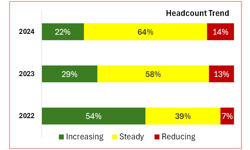Amidst a downturn in offline response rates, online sales have begun to provide a much valued source of subscriptions for magazine publishers, and with very reasonable costs per order.
At a time when search engines have been credited with directing as much as 85% of internet traffic to websites, it’s no surprise that subscription marketing teams have been quick to adopt search engine marketing (SEM) as a key part of their online strategy and to strive for top positions in search engine results.
So, is gaining control of the search landscape just about getting the top paid search result for keywords related to your brand, or is it about the bigger picture of optimising and co-ordinating all opportunities available through the search engines?
Whenever somebody types in a search term, there will always be other results listed alongside your own. What’s important is what share of the total available traffic you are getting, and how profitably it converts in to valuable customers.
SEM is a direct marketer’s dream – very measurable and with plenty of opportunity to test and analyse results. However, under the pressures of busy days and hectic schedules, many marketers struggle to find time to analyse and interpret the results of their search campaigns in the way that they would a direct mail shot or an email campaign. Perhaps this is because we rely on SEM agency experts – with their specialist knowledge and technical ability - to run the campaigns for us, and we trust them to allocate spend on the best possible words and positions for our paid search activity.
However, search engines are a complex marketing environment and the results deserve no less time and attention than other marketing campaigns. Search marketing should not just be about gaining the top spot within a given budget – it should be about understanding which keywords deliver the best conversion rates combined with the best quality orders. And it should definitely be about protecting your share of traffic from those keywords.
To truly be in control of your search activity, you need to dig deep and understand its behaviour.
Not all traffic coming to your site behaves in the same way. And, it is easy to look at your average conversion rates, and average order values, and not understand the mixed behaviour beneath.
The search landscape is a mix of various channels all coming together at one point, including your own paid and natural search activity, the activity of affiliates and subscription agents, and of course your competitors. To optimise all that this multi-channel can deliver requires a co-ordinated approach, and regular time and resource.
Natural Search
In the race to occupy the top spots, it’s easy to think that the paid search results are what most visitors click on. However, various sources claim the ratio to be 70:30 in favour of natural search results being clicked on. So, the number of natural results being clicked on is more than double the paid results which appear above them!
This has been linked to a trust factor, in that users know the natural search results have been purely generated from content and relevancy rather than the website owner paying for them.
In fact, ecommerce sites have reported that the traffic produced by natural search results is of a higher quality than paid search traffic, and converts better to sales. This isn’t always the case, but knowing which way round it is for your site is essential when deciding where to direct your spend and resource.
Natural search traffic may convert better to sales, or deliver customers who spend more per visit. You even may find that it delivers better quality subscribers who are more likely to renew.
With natural search being more difficult to control and slower to effect than paid search, it can become the poor relation in a search engine marketing strategy but you could be leaving out your most lucrative source of online traffic.
Paid Search Results
Whilst it can take many months to establish a high ranking in natural search, paid search results can put you in a prime position overnight, depending on your budget. What’s more, your paid search campaigns can indicate which keywords to aim for to optimise your natural search. Paid search quickly delivers volume of traffic, and many publishers find that their core keywords convert very profitably to subscription sales.
Pareto’s principle is very evident here, with a relatively small number of keywords often delivering the majority of sales. But a wide range of other words can each deliver small volumes that can boost your overall sales. It’s important to keep extending the range of words that you test. The further you get away from your core brand terms, the lower the conversion rates and the higher the resulting cost per order, but this can be offset by the very profitable results delivered by your best performing keywords.
Within your paid search activity, different keywords can bring different quality traffic. Traffic from some words may convert better to sales, or may have much higher first time renewal rates. It would be easy for you to focus on the words that are the lowest cost and drive the highest volumes of sales through your site, but what if these have very low retention rates?
It isn’t always about getting a paid search result in the top spot. Getting a lower priority spot will reduce the amount of traffic that you attract, but you could pay less for it and the traffic can be of a higher quality which converts better to sales. This may make it more feasible to sustain a profitable campaign on lesser-performing keywords.
As much as we don’t want to believe it, not everyone who searches on a brand term wants to buy from the brand owner. Some customers only feel they are getting a bargain by shopping via a price comparison site or from a third party. Whilst these orders may cost more than your own online orders, making your titles available through affiliate sites or adding them to a third party agency site will generally lead to growth in your total online sales. So, what role should they play on the search landscape?
Affiliates
Affiliates come in all shapes and sizes, and letting just any old site bid on your brand terms for paid search results is clearly bad business practice. You’ll end up paying through the nose for visitors who could have come to you directly. But it’s important not to dismiss the potential here to boost your overall presence on the search landscape and protect some of your keywords. You could be grossly underestimating the power of affiliates. There are a number of sites who have incredibly high traffic levels and whose websites have been well-developed to maximise conversion rates to a level that would make some of us green with envy.
By allowing trusted key affiliates to bid on your brand terms, you could be creating a bigger presence for your brand on the search landscape, giving potential customers more choice on where to buy and increasing your overall share of business from that keyword. You can work with your affiliates, without forcing up your own PPC costs or relinquishing the top position, by giving them clear guidelines on what positions to bid for. If you don’t want your affiliates to become lazy and only bid on the best performing words, you can make it conditional that a certain percentage of the commissions that they make from brand terms be re-invested by them in more generic terms to broaden your reach.
In addition, some affiliates may be able to afford to bid on keywords that you can’t. For example, the word ‘Gift’ is incredibly popular and expensive, especially at Christmas. But you may have an affiliate with a gift-focused site who successfully bids on this term. Build a relationship with that affiliate and demonstrate that you can successfully convert any traffic that they send you into sales and they will direct some of that valuable traffic your way. Your paid search team should be able to highlight words that you cannot afford to bid on or ones you fail to convert profitably from your own campaign.
Third Party Agents
Most of the key third party agents such as Magazine Group, LetsSubscribe and iSUBSCRiBE run their own paid search activity. It’s easy to think that they are simply stealing your business and instruct them not to bid on your brand terms. However this is worth testing, as quite often the additional online presence swells overall sales rather than shifting them from one source to another. Just as with affiliates, you can give them permission to bid on your brands terms on the condition that they keep their bids below a certain level to make sure that you retain top spot.
Summary
By approaching search engine marketing with a multi-channel mindset and combining all of the key elements together, it is possible to be in control of the keywords that work best for you and to maximise the return from your online marketing investment. Allocate time for an in-depth analysis of your current activities to benchmark performance to date, and then give regular time and resource to proactively manage these channels.
| Dos and one Don’t * Do make sure you are optimising natural search terms. * Do be creative with your paid search – have you really tested all potential keywords that could lead people to your brand? * Do remember that many subscription marketing budgets are not big enough to warrant lots of attention from your agency – you need in-house resource to co-ordinate the various channels and make sure they are being proactive. * Do develop relationships with key affiliates and your third party agents so that your paid search efforts are co-ordinated. * Do dig deep and fully analyse the figures available to you. This will help you to separate quality from quantity – even if you still want to tap into both! * Do apply all of your direct marketing expertise to this valuable channel – test, analyse, refine, test… * Don’t assume that your site conversion rates are purely based on landing page design and content. Evaluate the quality and conversion rate of different streams of traffic right back to source. |










